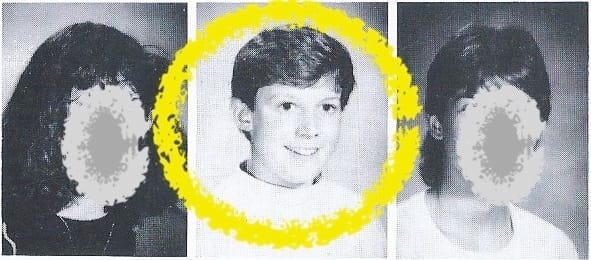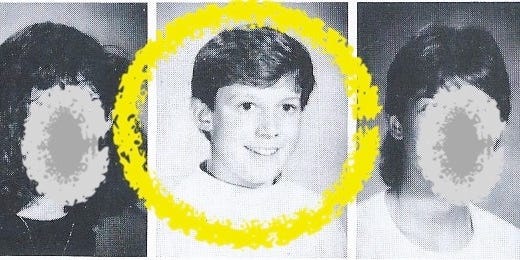The short end of the stick
My oldest grudge says more about me than it does about anything else.
I remember the names of just two teachers from my ninth-grade year at Mazama High School in Klamath Falls, Ore.
First was Mr. Kessler. He taught biology and was considered a tough grader.
The other was Ms. Houston. She taught P.E., and on the final day of my freshman year, she weighed and then measured each student. When it was my turn, I stood with my back straight against the wall as she placed her wooden clipboard atop my head.
“Four feet 11,” she said, “and one-half.”

My cheeks suddenly felt warm, flushed with embarrassment. Another student in the class — I don’t know who — asked, “Can’t you round up?”
I’ve been short my entire life, but I’ve never felt smaller than I did in that moment. Ms. Houston might as well have used a megaphone to announce, “Here on the final day of his ninth-grade year is a 15-year-old for whom puberty is little more than a rumor.”
This is — I believe — my oldest grudge. All things considered, it is also utterly benign. My voice changed later that summer, I added a few inches and while I was still shorter than most of my classmates the next year, I was not abnormally short.
Today, I stand 5-7, and while I am self-conscious about my weight, I am absolutely and utterly at peace with the reality that I am not by any measure tall or even average. That doesn’t mean I can’t use that story from my freshman year to get laughs, though. I’ve come to embellish it a little, too, saying that I responded by asking the teacher to, “Give me 5 feet!” as she penciled in her overly precise measurement. As with most things about relate to our minds, however, this one says more about me than it does about anything else.
First, I have a pretty good memory.
It’s not photographic by any stretch. I’m not even sure if my memory would be considered great compared to the population at large, but it is absolutely above average, and this ability to retain and later recite (potentially useless) bits of information like the fact that my ninth-grade P.E. teacher’s first name was Patricia has served me pretty well as a sports journalist. I can name the starting rotation of the 1986 New York Mets, the backup point guard on the UCLA basketball team that won the 1995 NCAA men’s title at the Kingdome and if you give me a little bit of time I can list the starting quarterbacks in every Super Bowl going back to early ‘80s.
Second, my memory is at its absolute best when used to catalog the various ways in which I’ve felt slighted, wronged or harmed in some way. Turns out that my mind is a god damn bear trap when it comes to holding onto every bit of information relating to a situation in which I believe I got hosed. I do not hold grudges so much as I cling to them.
Sometimes these grudges are funny such as the way I feel about the aforementioned Ms. Houston or my everlasting dislike for the Oklahoma City Thunder.
Some of my grudges, however, aren’t so silly. Like the former boss who rolled back a raise months after it had been given to me at ESPN.com or the radio host from a rival station who once asked on Twitter if my wife was an imbecile, saying he would pull back on his criticism if she were playing at a disadvantage. This insult was particularly rich given the fact that he had to ask someone else to confirm the spelling of imbecile before posting.
And then there was the grudge I held against my stepfather, which was so serious I didn’t really count it as a grudge. It was more foundational than that. I’d seen everything my mom sacrificed for him and then watched as she spent years wading out of the mess he left behind when the marriage ended. While I’ve come to realize that the way I held onto this anger was unhealthy, even now it’s hard for me to say I was wrong to feel that way.
It wasn’t just that my mom decided he’d been unfaithful and dishonest with her.
It wasn’t just that he’d lost his job as a public-school official in embarrassingly public fashion, eventually subjected to an investigation by the county’s district attorney on his way out the door.
It wasn’t just that he spent through their retirement savings prior to their eventual divorce.
It was that he’d done all that and then been unwilling or unable to show anything resembling accountability let alone remorse. He seemed to feel he was the one who’d been wronged.
I spent years imagining ways I might express the anger and outrage I felt toward him. This usually involved some sort of public recitation of his transgressions. I worked in media after all. Doing this, I imagined, would force him to feel some measure of the discomfort he had caused all of us.
There were several things that kept me from acting on this, though, the primary one being my knowledge that I was not the central character in this drama. I was 15 when he married my mom, in the middle of that freshman year where I remained sub 5 feet. After I graduated high school, I picked a college two states away, and while I returned home for the summer after my freshman year, I decided that was the last time I’d live in the same house he did. I had the benefit of distance. My stepfather had more of an impact on the lives of my mom and my younger brother, and I didn’t want my feelings to make things any more complicated or worse for either of them.
I was also aware that I wanted some measure of revenge, which I was raised to see as a shallow and emotionally superficial motive. I also knew that it might not provide the emotional payoff I wanted, having learned through experience that when I act upon the anger I feel, I tend to regret what I’ve done.
So, I tucked my anger away, deciding to hate him in an enduring and unyielding fashion. It was — I realize now — a grudge. A large, craggy thing that I kept largely out of sight. I always knew it was there, I just didn’t realize how it was hardening over time, the edges becoming dangerously sharp.
I was 47 years old when I realized that this grudge was a problem. At that point, I had not seen nor spoken to my stepfather in 15 years.
I’ve spent nearly three years now chipping away at this mass of anger and resentment I felt toward him, a process that has taught me a great deal about myself, specifically, as well as about anger and resentment in general. I’ve come to understand this grudge that I held against my stepfather became a template for how I coped with feeling hurt by someone who then refused to acknowledge my pain. I would store these events in that above-average memory of mine, essentially bottling the anger I felt instead of processing it. Over the past two years, I’ve popped the top on not just this grudge against my stepfather, but several others, stirring their contents and eventually adding a bit of acceptance to the mix to try and make them a little more palatable, a little less dangerous.
Last December, I flew across the country to see my stepfather for the first time I’d seen him in 18 years. On the second day of my visit, I interviewed him for more than five hours about his entry into our family and the events that led to and followed his divorce from my mom. I’m going to explain what happened, eventually, but that’s just one element of this newsletter.
I want Grudgery to be an open-ended exploration of the topic of resentment in general and grudges in particular. I am going to talk to therapists and academics. I’m going to analyze examples from business, politics and the world at large to show how our world is shaped by all the different ways that people come to express their resentment ranging from the comic to the tragic. I’m going to share the stories I come across as I continue to explore this topic.
Turns out that I don’t just have a tendency to hold grudges, but I possess a fondness for them that endures even as I’ve worked to temper the influence that resentment has had on my behavior. I find a certain amount of delight in drinking in a story about someone who decides that they’re just not going to get over something that happened to them. I know this is not an advisable approach nor is it particularly likely to produce the desired result for the person holding the grudge, but there is a visceral appeal that I feel when I find out that someone veered off the high road and decided to get down and dirty with someone who’s irked them in some way.
Are grudges good? No. I don’t think they are. I believe they are natural, though. They serve an evolutionary purpose, and they’ve provided motivational fuel for some of the best athletes we’ve ever seen as well as the most divisive politician of this era. Grudges can be changed, too. I know because I’ve experienced that, and cleaning out this dark little corner of my psyche that had grown sticky from all these grudges has had a tremendously beneficial impact not just on how I feel, but what I can envision for myself going forward.
That’s all going to be part of this newsletter in the weeks and months ahead, and if it turns out to be something that doesn’t interest you, you can unsubscribe at any time. Don’t worry, I won’t hold it against you. I’m trying to erase my grudges, not add to them.




